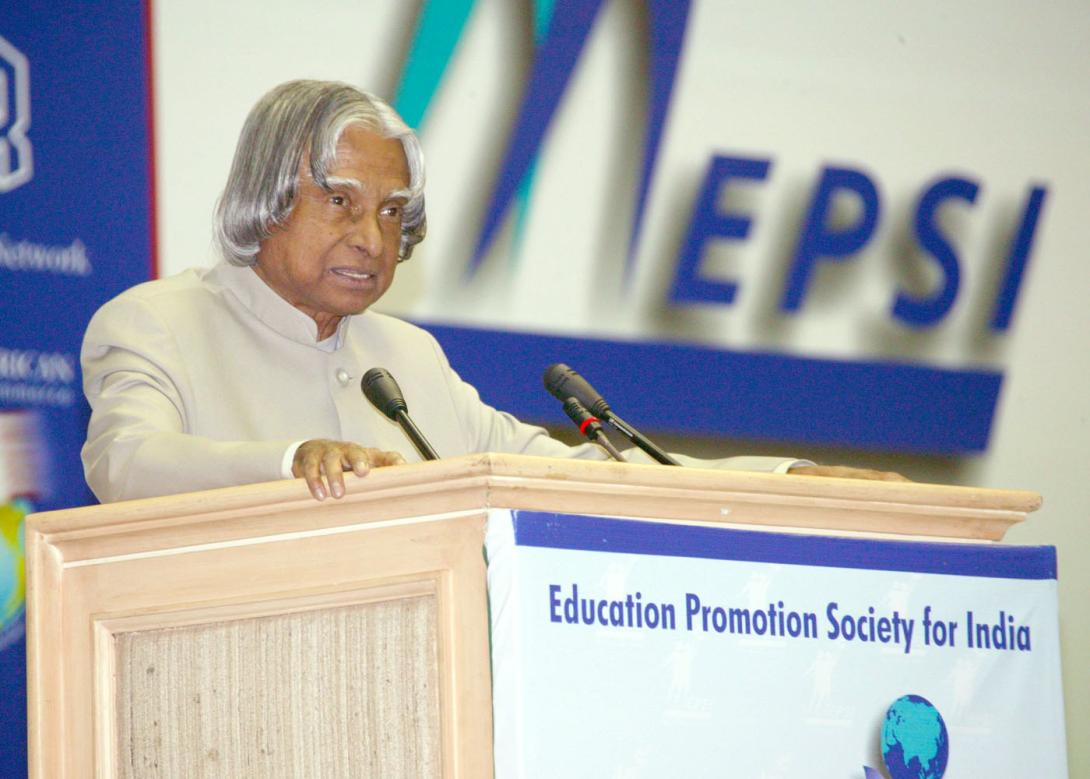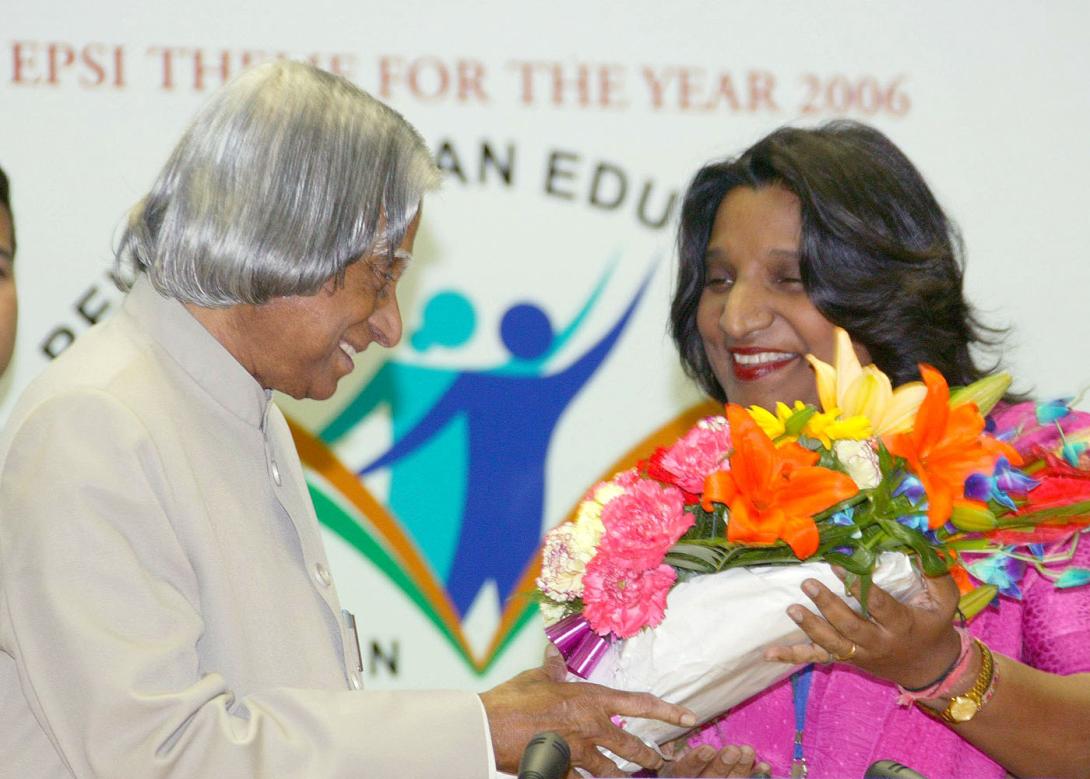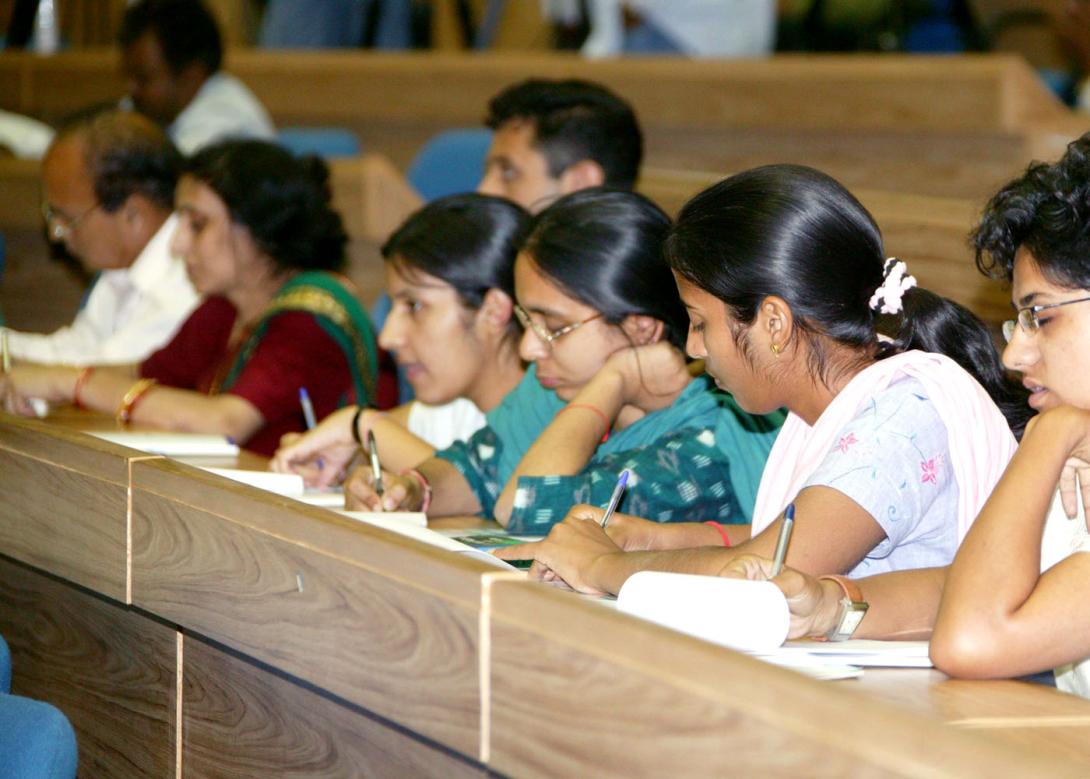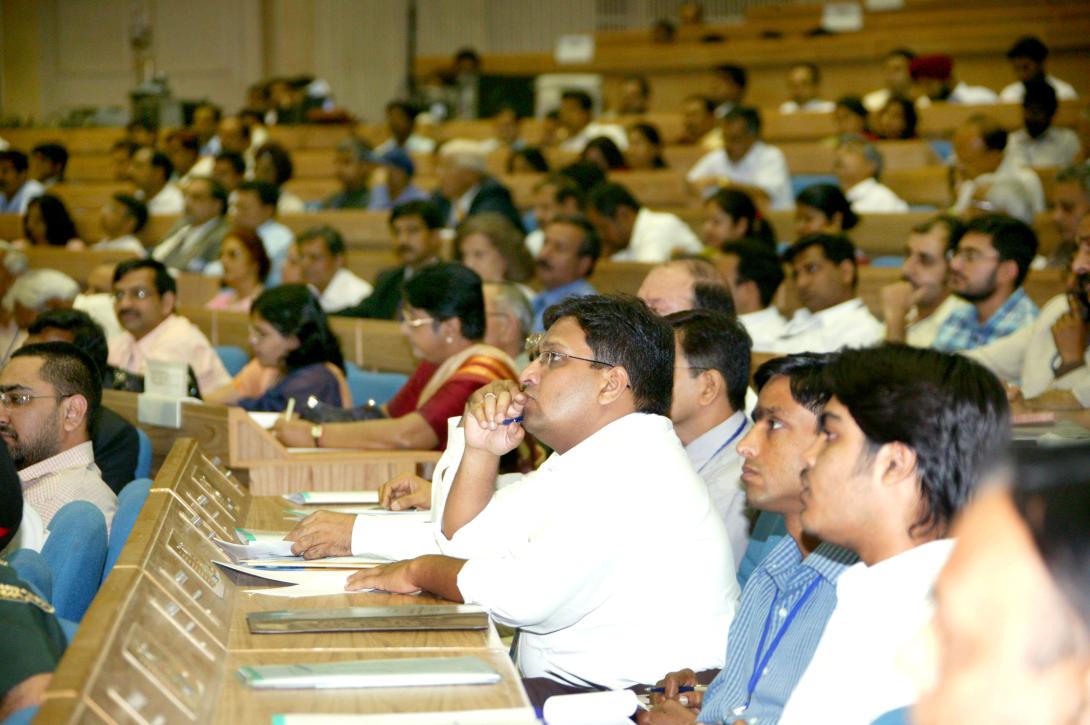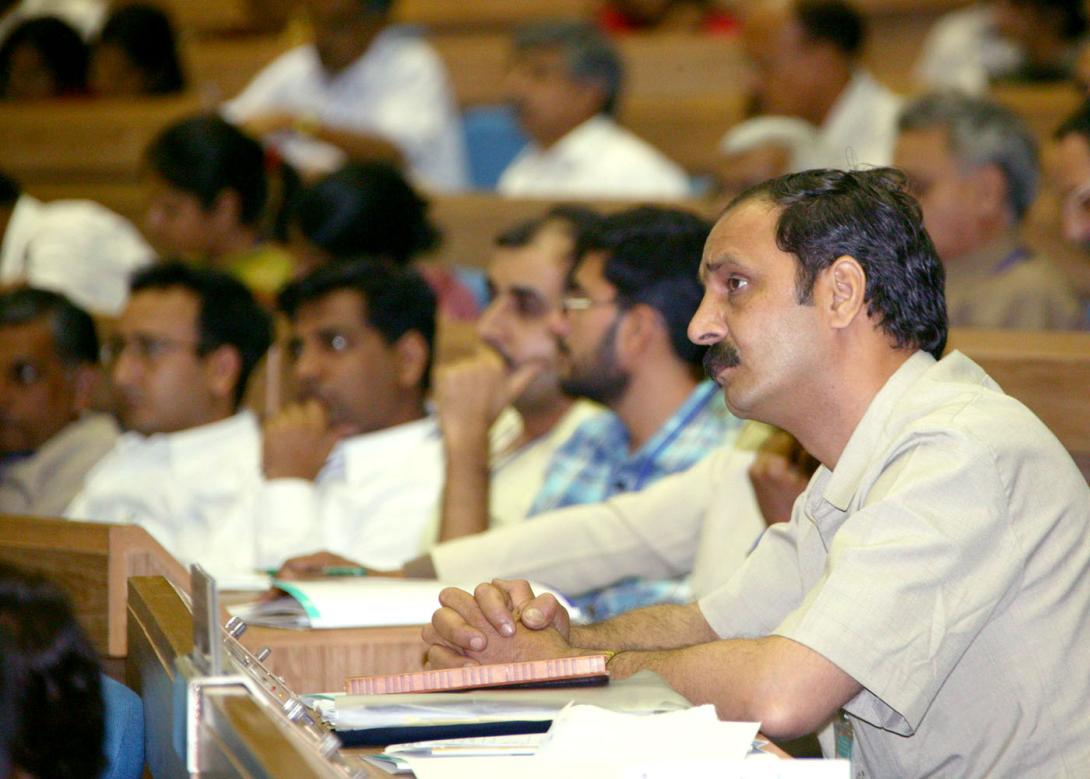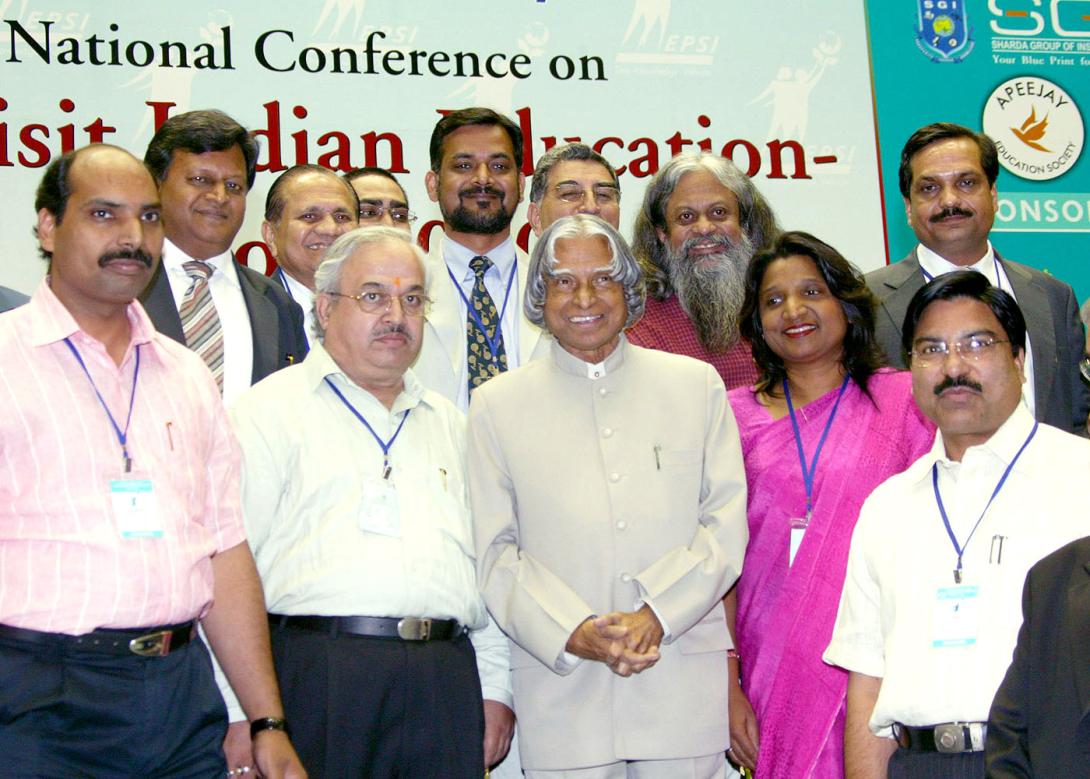Plenary Address At The National Conference On 'revisit Indian Education: Vision 2020 - Challenges Ahead', New Delhi
New Delhi : 04-04-2006
Education has to lead to capacity building among students
" Learning gives Creativity
Creativity leads to thinking
Thinking provides knowledge
Knowledge makes you great?
I am indeed delighted to participate in the National Conference on "Revisit Indian Education: Vision 2020 ? Challenges Ahead". My greetings to the organizers, education planners, education providers, regulators, accreditation agencies, vocational trainers, representatives of industry and other distinguished guests. I am very happy that Education Promotion Society of India has been researching in areas such as: Challenges for Primary and Secondary Education, Autonomy in Higher Education, Vocational Education, Industry Academia Relationship and Excellence in Technical Education leading to the preparation of Indian Education report for submission to the Government by January 2007. Since, I am in the midst of expert in various fields particularly education, I would like to discuss on the topic 'Education has to lead to capacity building among students'.
Capacity Building Model
When the students come out of the educational institutions certain capacities are required to be built in them to deal with the real world, particularly to grow in their professional career and participate in the national development. I suggest that the ingredients for capacity building must be embedded right from the beginning of the students? life from primary education to higher education. A good educational model is the need of the hour to ensure that the students developed as enlightened citizens and also participate in national development missions.
For participating in the nation building tasks: the capacities required to be built among the students in their formative years by the educational institutions are: The capacity for research or inquiry; the capacity for creativity and innovation; the capacity to use high technology; the capacity for entrepreneurial leadership; and the capacity for moral leadership.
a. Research and enquiry: The 21st century is about the management of all the knowledge and information we have generated and the value addition we could bring to it. We must give our students the skills with which they find a way through the sea of knowledge that we have created and continue with life long learning. Today we are empowered by technology to teach ourselves beyond classrooms and become life-long learners. This is indeed required for sustained economic development of the nation and also individual prosperity.
b. Creativity and Innovation: The management of knowledge in the 21st century is beyond the capacity of a single individual. The amount of information that we have around is overwhelming. The management of knowledge therefore must move out of the realm of the individual and shift into the realm of the networked groups. The students must learn how to manage knowledge collectively and to work in multi-disciplinary teams. When the information is networked the power and utility of the information grows multifold as predicted by Metcalfe's law. An information that is static does not grow. In the new digital economy, information that is circulated across enterprise, creates innovation and eventually contributes to national wealth.
c. Capacity to use high technology: Every student in our schools and colleges should be brought in contact with technology to aid their learning process. Educational institutions should be equipped with adequate computing equipment, laboratory equipments, Internet facilities with high band width connectivity and provide an environment for the students to enhance their learning ability. In the midst of all of the technological innovations and revolutions we cannot think that the role of the teachers will be diminished. In fact the teacher will become even more important and the whole world of education will become teacher assisted and would help in "tele-porting" the best teacher to every nook and corner of the country and propagate the knowledge. The teacher becomes a facilitator and knowledge manager.
d. Entrepreneurship: The aptitude for entrepreneurship should be cultivated right from the beginning and in the educational environment both in the Schools and the Colleges. We must teach our students to take calculated risks for the sake of larger gain, but within the ethos of good business. They should also cultivate a disposition to do things right. The inner being must be illuminated with righteousness. This capacity will enable them to take up challenging tasks later.
e. Moral leadership: Moral leadership involves two aspects. First it requires the ability to have compelling and powerful dreams or visions of human betterment. Moral leadership requires a disposition to do the right thing and influence others also to do right things. There is a need for inclusion of "moral science" class as a part of education in all the schools and colleges. This is essential for promotion of value based education leading to enlightened citizenship. Here I would like to share with you my experience in St. Joseph?s College.
I remember the lectures given by highest authority of the Jesuit institution Rev Father Rector Kalathil of St. Joshep?s college, Trichirappalli, Tamilnadu. Every Monday, he will take class on moral science for an hour. He used to talk about good human beings, present and past, and what makes a good human being. In this class he used to give lectures on personalities such as Buddha, Confucius, St. Augustine, Califa Omar, Mahatma Gandhi, Einstein, Abraham Lincoln including some scientific personalities and moral stories linked to our civilizational heritage. It is essential in the secondary schools and colleges to arrange a lecture by a great teacher of the institution once in a week for one hour on India's civilizational heritage. This class can be called as a Moral Science Class. That will elevate the young minds to love the country, to love the other human beings and elevate the young to higher planes. Even small things not morally right prove fatal at a later stage as some congenital defects resulting in mortality.
In sum, inquiry, creativity, technology, entrepreneurial and moral leadership are the five capacities required to be built through the education process. If we develop in all our students these five capacities, we will produce "Autonomous Learner" a self-directed, self controlled, lifelong learner who will have the capacity to both respect authority and at the same time is capable of questioning authority, in an appropriate manner. These are the leaders who would work together as a "Self-organizing Network" and transform any nation into a developed nation in a time bound manner.
NCERT Educational Initiatives
At this point I would like to mention about the initiatives of National Council of Education Research & Training (NCERT), Ministry of Human Resource Development, which has resulted in the formulation of the National Curriculum Framework ? 2005 which aims to :
(a) Connect knowledge to life outside the school
(b) Ensure that learning shifted away from rote learning methods
(c) Enrich the curriculum to provide for over all development of children rather then remain textbooks centric and
(d) Make examination more flexible, non threatening and integrated into classroom life.
NCERT is in the process of textbook development which will be introduced in various classes during the period 2006 to 2009. This is definitely a good initiative. But, it is limited to schools following the CBSE syllabus. If the same can be applied to all the schools following various state syllabi also, it will have a larger impact. Any new syllabus becomes purposeful only if the teacher absorbs the purpose. All the more important that our education system has to equip our schools and colleges with teachers who love teaching.
Capacity Building Mission
The question which arises in our mind is, how we can ensure that all our Primary Schools, Secondary Schools and Colleges build this capacity among the three hundred million youth who are being taught by our education system at different levels across our vast country. One of the important things our schools and colleges must realize is that the School and Colleges as an Institutions and the teacher as an individual are accountable for the good performance of the students. This accountability has to be brought through a well structured accreditation mechanism. It is also essential that our teachers are paid in time and paid adequately consistent with this societal responsibility.
Accreditation Mechanism
For evaluating the academic performance of schools and colleges there is a need to create a number of accredited accreditation agencies both in the public and private sector. There is some experience through the use of National Assessment and Accreditation Council (NAAC), which is presently serving accreditation needs of universities and colleges in a limited way. This has to be reinforced with a newly conceived system of public private partnership. Culture of accreditation has to spread to all the schools and colleges run by government, government aided and private sector schools and colleges through out the country. The criteria for the assessment could be: relevance of curriculum to meet the national development needs, teaching ? learning ? assimilation evaluation leading to development of employable skills, research consultancy and extension, infrastructure and learning resources, students support and progression, organization and management, transparency in admission system and promotion of value based education towards the evolution of enlightened citizens. Education system has to get graduated to the evaluation standard of professional ISO certification for teachers, teaching and laboratories.
Accreditation process must also establish weak areas of each school and provide implementable suggestions for time bound improvement: through inter school or inter college collaborative ventures providing time specific managerial support from school with proven track record to schools needing assistance and also having a periodic meeting among all the schools and colleges in one region to share the good practices followed and recognize the results coming out of these practices. In all these meetings, select group of parents, renowned educationists, social reformers and industry captains may also be included. Aim should be to assist the development process rather than being critical of approaches. To start with, it may be useful to invite reputed international accreditation agencies for a limited time period till our accreditation agencies develop the necessary skill and culture for promotion of quality human resource meeting the international competitive requirements in all sectors of economy.
Education and Entrepreneurship
Now I would like to discuss the importance of entrepreneurship in formulating our curriculum in the schools and colleges. A study conducted in many countries has established that the large economic growth of any nation is dependent on the large number of small and medium enterprises contributing to the nations? wealth generating capability. The academic institutions in India presently generate about three millions graduates per year and the students completing 10th class and 10+2 will be around 7 million. All of them seek employment either within the country and abroad. Now the school syllabus and university syllabus have to be integrated with entrepreneurship courses. However the research oriented students should have freedom to choose special research oriented courses in which he or she has expertise. The students at the end of the course should get a certificate or a diploma. This will enable students qualified in these schools and colleges irrespective of they have studied in a professional institution or not, to have the confidence that they can start the small enterprises in agriculture, manufacturing or services sectors. Banks have to be entrepreneur friendly and should give them venture capital and support these young entrepreneurs and their creative ideas. This system will change the situation in all the States and Union Territories by generating employment providers rather than employment seekers. This will automatically bring the total credibility and respect for the education system.
Convergence
In future, we would witness the emergence of new areas in the interface of science and engineering. Soon our research frontiers would become borderless. Further, in the area of globalization, any work place would showcase a multi-national and multi-cultural work force creating knowledge and opening new frontiers of innovation with no constraints placed by geographical separation and time zones. For our education system to succeed, it is important that we prepare our students to work and innovate in such environments and our students must become partners to knowledge creation. They must become sensitive to the impending convergence of many areas of science and engineering and become creators of new emerging areas. For example, convergence of biotechnology and information technology leads to bio-informatics. Bioscience information science and nano science leads to Bio-info-nanoscience. We should recognize that the subject in arts and humanity, commerce and technology will get integrated particularly with the product application of convergence technology.
Dynamic Teaching Environment
In the geographically shrinking world of global village, the students with qualification would seamlessly enter in industry from the college and industry worker to the college for additional educational experience. Industry of the future would also do significant levels of research and the universities would also significant amount of product development. This seamless environment of innovation to be meaningful there must be a large scale involvement of private industries in education and the government should ensure an environment that is fair, homogeneous and of high quality. I visualize our university teaching and research centers with fifty percent teaching staff drawn from all the three sectors of the economy and our industries will have similar number of teachers and professors participating in design, development and manufacturing of products. Our education system must prepare itself for facilitating such a dynamic and creative environment.
Conclusion
Education system indeed has to discover and build on the strength of the students and bring out the creativity which will gradually result in development of a responsible citizen. Hence, our education system must re-orient itself to help students to know what strengths they own, as every human being born on this planet has been blessed with certain strengths.
Ultimately education in its real sense is the pursuit of this truth. It is an endless journey through knowledge and enlightenment. Such a journey opens up new vistas of development of humanism where there is no scope nor room for pettiness, disharmony, jealousy, hatred or enmity. It transforms a human personality into a wholesome being, a noble soul and an asset in the Universe. Universal brotherhood in its true sense becomes the sheet anchor for such education. Real education enhances the dignity of a human being and increases his or her self-respect. If only the real sense of education could be realized by each individual, and carried forward in every field of human activity, the world will be so much a better place to live in.
My best wishes to all the members of Education Promotion Society of India in their Mission of improving the delivery mechanism of education at all levels which is fully tuned towards creation of enlightened citizens who in turn will transform India into a prosperous, happy, strong and safe nation.
May God bless you.

